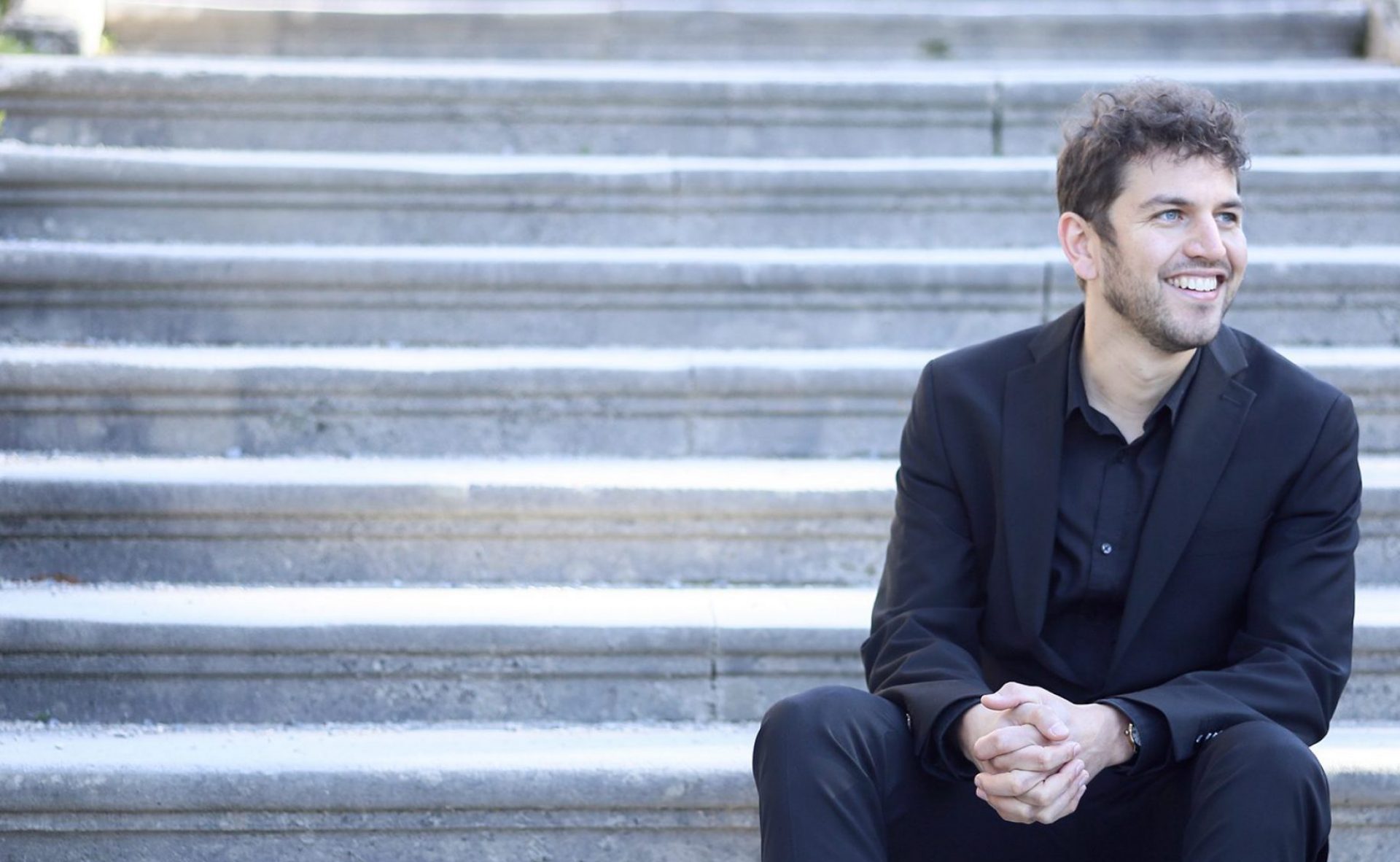I got to know Jan Croonenbroeck when I worked in Darmstadt, where he has been the Studienleiter and Kapellmeister at the Staatstheater since 2018. Jan comes from the German city of Münster and is not just active in opera, but is also an organist and musical director of the ensemble Seicento Vocale. Before his current position, Jan worked at Oper Stuttgart and at Staatstheater Nuremberg, and has also participated as an Assistant Conductor at the Bayreuth Festival. Since being in Darmstadt Jan has conducted a number of shows including Un Ballo in Maschera, Die Zauberflöte, Lucia di Lammermoor, and the musical Kiss Me Kate.
This interview was originally done in German. For the German version, please click here.

You notice with the different singers that they bring different energies from within themselves, from their character, and you work with that.
If you hadn’t chosen opera, what profession would you have liked to pursue?
I think I would have become a teacher, for Music and German.
If you could have dinner with a famous person from history, who would you choose?
I think Bach or Bernstein. Or both together – that would be interesting, too. I wonder if there would be enough room for both egos. Maybe I’d rather see them separately!
Do you have a favourite instrument?
From the top of my head I would say cello, but I’ve never pursued it.
Favourite opera?
If I had to say quickly, I would choose Peter Grimes. There are a dozen or so operas that I really like. Definitely Peter Grimes, Jenufa is there, and also Elektra and Salome. With Peter Grimes and Jenufa, it’s not this familiar love triangle jealousy story. It’s a plot in a way that feels more relevant to me than in other operas. And on top of that, the music is incredibly powerful.
Favourite composer?
It was Mahler for a long time. But somehow, since I’ve been involved in opera, I’ve had little to do with Mahler and not been so important for me. Now it’s more the great ‘Brs’ of music history: Britten and Brahms.
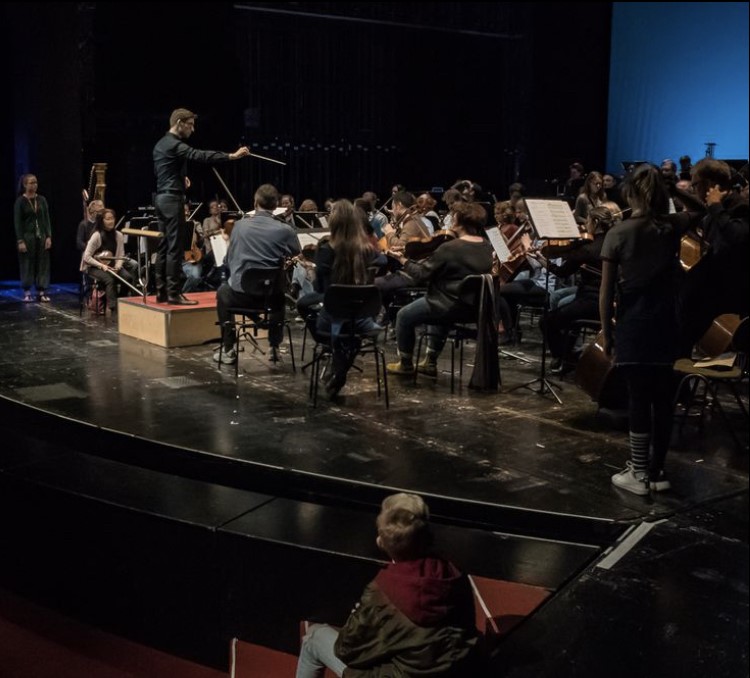
Copyright: Stephanie Werner
How did you get into opera and why did you decide to pursue it as a profession?
The deciding factor was definitely that I sang in the children’s choir in fifth grade at school. The school was asked if they wanted to do the children’s chorus in Carmen at the Stadttheater, and that was my introduction to opera. That was definitely when I first got a taste for it. We did Carmen, La Bohème, Evita and Jeanne d`Arc au bûcher by Honegger. And when Penderecki’s Paradise Lost was being rehearsed, I joined in at first, but unfortunately my voice was breaking. I watched the rehearsals anyway, because the piano rehearsals had already excited me so much. I was completely enthusiastic about this theatre world, which is why I thought it was such a pity when my voice broke.
At that time, I even wrote a letter to the GMD1, Will Humburg, asking if I could sit in on his rehearsals. On the very first evening, it was the dress rehearsal of Götterdämmerung, and he allowed me to sit in the orchestra pit. I was thirteen years old and sat there with a big score that, looking back, I couldn’t actually read properly! I sat there in the orchestra pit and was simply blown away by this harmony and everything around me. I then continued to observe how it all works and how the conductor holds all the threads together, and knew that I also wanted to work in the theatre one day.
What are the advantages of being a Studienleiter2 and how does it relate to conducting?
I think it is really important that the conductor really knows how a theatre works and all the tasks involved. They can only say why things should be done and how if they really have a clue about it. I feel that as a répétiteur you learn the operas very thoroughly, and I don’t know how people do that who haven’t been repetiteurs before. It’s probably a very different way of learning pieces. I’m happy to learn as much repertoire as possible as a répétiteur. One of the perks of being a Studienleiter, of course, is that I can delegate, and thus have a bit of a say in what my responsibilities are.
What do you like about working with singers?
When working with singers I think it is really interesting to do the same role with two different singers. I am not a singing teacher. The singers have to do a lot of their own work with the voice. There are certainly accompanists who say much more technically. I do less of that. You notice with the different singers that they bring different energies from within themselves, from their character, and you work with that. They have to know what the conductor or the director needs, which is exciting – especially in the area of communication. I like the part of the job that involves communication, now even more as a Studienleiter than before as a répétiteur. As a Studienleiter you are forced to communicate with completely different departments of the theatre. But of course the singers are the ones you have to deal with most closely, and so I almost find it a pity that I now do less one-on-one coaching. But I’m also glad that I’m conducting instead. The combination of Studienleiter and Kapellmeister3 is exactly the experience I want to have at the moment.
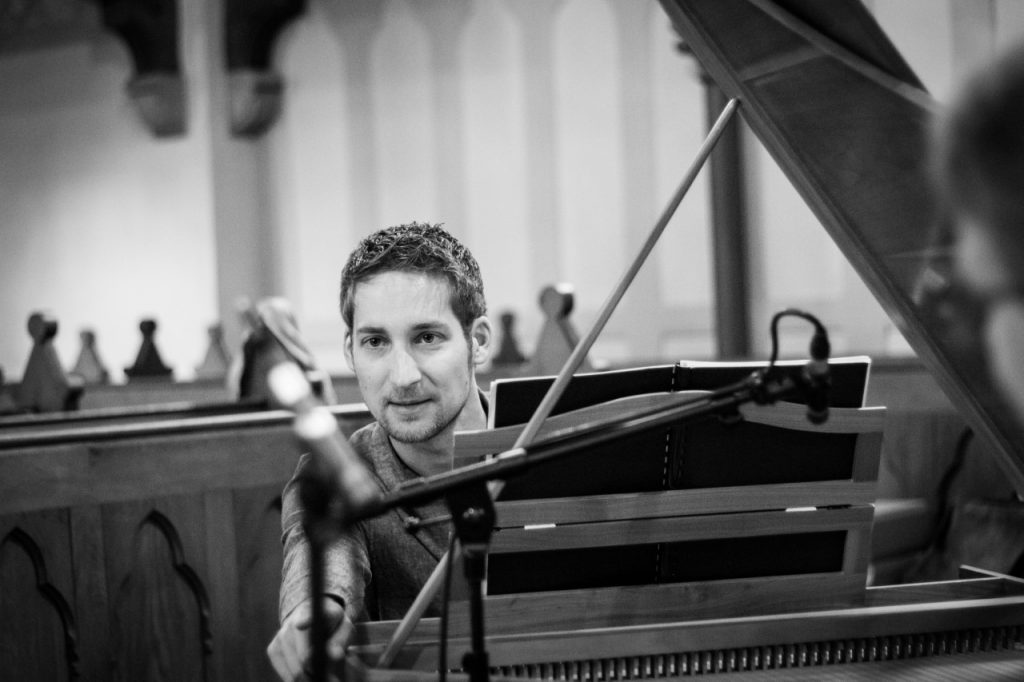
Copyright: Winfried Hyronimus
The important thing in the very first Nachdirigieren is not to mess up the transitions, and to bring the whole ship home accident-free…When the piece is happening, you generally have to have a sense of when the orchestra need a conductor and when they don’t and then also know ‘what else do I want to contribute?‘
How do you see the balance between being conductor and Studienleiter? Would you prefer to do more of one in the future or maintain the balance that you have at the moment?
It’s a challenge to live up to the high standards you can set for yourself. The Studienleiter should actually be able to perform every piece on the piano, and I think I’ve got that side of it sorted quite well by now. But of course I don’t know every piece equally well. In the ongoing, daily rehearsal process, with simultaneous reshuffling of revivals or spontaneous changes of cast in the case of absences due to sickness, you can’t be involved everywhere. That’s what a team of talented, experienced and motivated colleagues is for.
I am happy about every piece that I can conduct here, and with those that I “only” play for, I hope that I learn them in such a way that it helps me when I encounter the same ones again later on in my professional life. I’m happy with the balance for now, and also with how it’s developing. I am curious how it will continue and how long it can continue. There are more goals, more things to conduct, and at some point it will become clear what the right position for me is in the long term.
What are the difficulties of taking over a production from another conductor (Nachdirigieren)?
Although every piece sounds different when a different conductor does it, for my very first post conducting in college, my professor said that for Nachridirigieren, I should adopt his tempi and not make a big deal of my own art, like inventing new ritardandi or something. And pragmatically, of course, that’s true. The important thing in the very first Nachdirigieren is not to mess up the transitions, and to bring the whole ship home accident-free. The safest way is to do everything as exactly as possible as the musical director of the premiere. That’s definitely a good way through the performance, because the orchestra is totally trained on those tempi and on those transitions. I then study all of that in the video from the conductor’s camera. It’s most important to show the transitions really clearly.
When the piece is happening, you generally have to have a sense of when the orchestra need a conductor and when they don’t and then also know ‘what else do I want to contribute?’ Maybe I see the phrasing or the tension flow differently and want it to stay quiet longer or something. That only works with trust in non-verbal communication. I am very happy that I have the feeling that I get along quite well with the orchestra here in Darmstadt. You can only learn to conduct if you do it often and through it become freer and more independent.
What advice would you give to colleagues who want to get into your position?
I don’t think I have any good advice! If you want to do it badly, then you should just do it somehow. You should be a good répétiteur for it, also a good conductor, and have organizational skills. But I think there are very different ways to be convincing in this field. There are different, individual profiles of a Studienleiter. There are some who are very artistically ambitious and less organized. Or there are those who are much more meticulously organized and tend to delegate the piano playing. And neither of these ways is wrong. It’s a question of what the team in the theatre needs right now and where you want to go with it.
You used to be an organist – like me. How did that help your music-making?
I always wanted to have something to do with orchestral music, and the organ is like a huge imitation of an orchestra. In certain styles, you kind of have the same jobs as a conductor with a big orchestra does. Even in the music, you can compare symphonies by Bruckner with organ works. With the organ you have to think about timbres and finding the right balance and registration, just like when you look at the score as a conductor. I think there’s a big intersection between conducting and playing the organ.
I absolutely love playing the organ, but when I compare the two, I feel a greater attraction to our work in the theatre, because in the end we create everything together as a team. That’s a blessing and a curse, but in the end the result is always something we’ve created together.
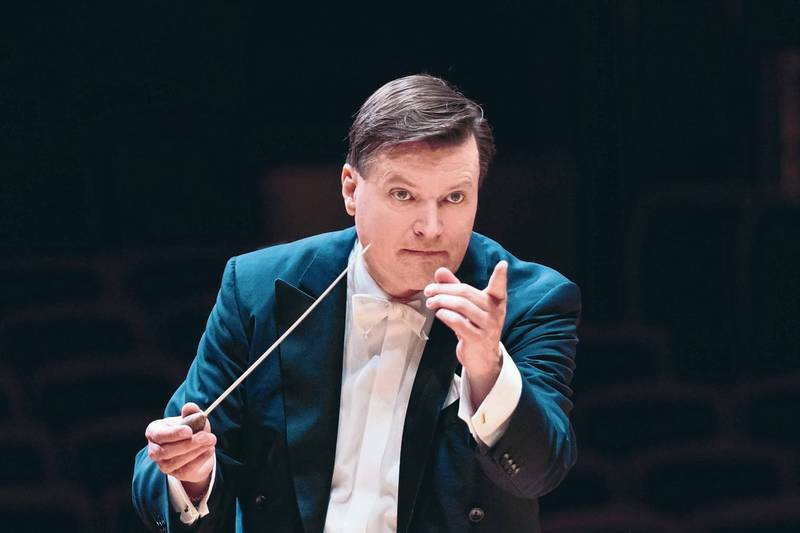
Thielemann conducted and rehearsed Tristan and Isolde and Lohengrin by heart and was able to say every word. This knowledge is fascinating and was great to witness.
In 2018, you did Lohengrin at the Bayreuth Festival with Christian Thielemann. What did you learn there?
It’s so fascinating when the orchestra has such a high-calibre cast and the conductor knows the pieces inside and out. Thielemann conducted and rehearsed Tristan and Isolde and Lohengrin by heart and was able to say every word. This knowledge is fascinating and was great to witness.
I was really surprised that individual soloists in leading roles come in much later and then take over the staging that their rehearsal cover had worked out with the director beforehand. That was probably strictly forbidden in Bayreuth, at least in earlier times. I think there’s a loss in that in terms of team building, and definitely you lose on the directing side as well.
On the musical side, it was enriching to meet with so many excellent répétiteurs and assistants, mostly répétiteurs or Studienleiters from other houses. And it was impressive how stars can arrive later and fit right in. An experienced conductor like Thielemann knows exactly when he can help whom and how. That impressed me very much. I definitely want to go back to the Grüner Hügel at the next opportunity.
You also worked together with Simon Rattle at the festival in Baden-Baden. Can you tell me more about that?
That was La damnation de Faust by Berlioz. When I was still Assistant Chorus Master in Stuttgart, the Chorus there was asked to take over the choral part in two concert performances in Baden-Baden at the Festspielhaus, where the Berlin Philharmonic was a guest with Rattle. Unfortunately, I only had one rehearsal where I played for Rattle, but it was such a pleasure because he was so friendly, had a good plan of the piece and still had energy for a joke or two. It was a great encounter artistically and I felt it was very free music-making, although my heart was definitely beating hard to get everything right and somehow play by heart as much as possible and keep my eyes glued to his hands. I can remember with him that I felt very encouraged to play. That felt good.
Would you like to say something about your work at Hawaii Opera Theatre?!
I’d love to! I was fortunate to be referred there through a professor at the Detmold University of Applied Sciences, Prof. Ivan Törzs, who conducted very regularly at Hawaii Opera Theatre. It was a kind of exchange through the university.
From experience, during a rehearsal period for a new production, there is a time when everyone gets on each other’s nerves. With six weeks of rehearsals, this is often the case in the third week. This is quite normal and always part of the creative process. In Hawaii, it was very mild because everyone was in a good mood about being there! It was a very special working atmosphere, especially because of the circumstances: if you had time in the evening, you went to the beach for a short while and saw a wonderful sunset. I’d be happy to be back there again sometime.
The opera choir of the Hawaii Opera Theatre is really sweet and has a lot of heart. We could do with “The Spirit of Aloha” at our German theaters and try and create it together, but it probably only works well in Hawaii!
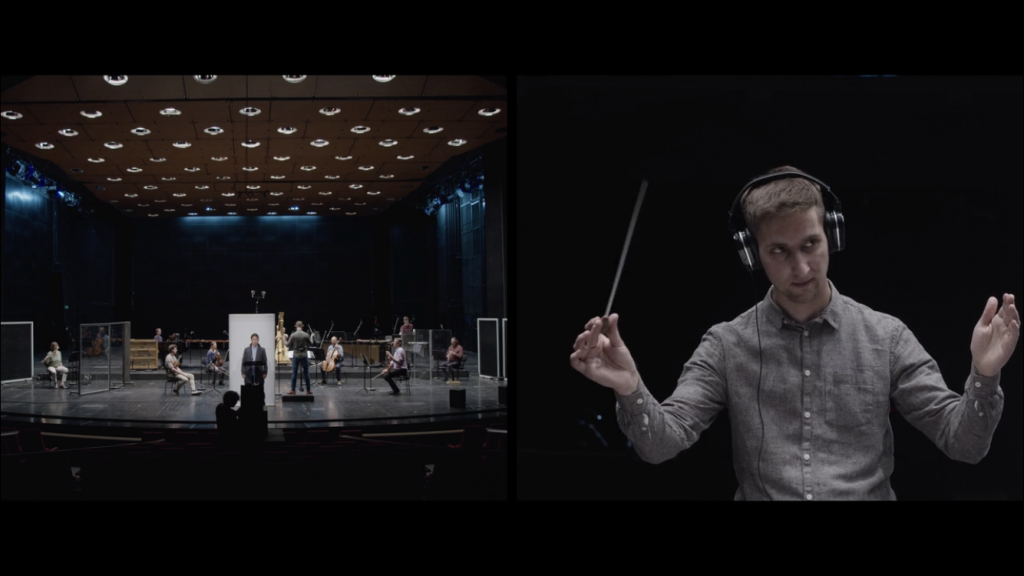
Copyright: Fabio Stoll
In the audition I pay attention to whether it touches me somehow, whether the intonation is right and how it is technically mastered. The most important question is of course, am I interested in hearing and also seeing the person on stage?
What would you change about the German theatre system?
I have the feeling it has been under discussion for some time that we need to change something about how roles are cast. When it comes to a choral or orchestral position, it’s important to test how someone contributes to a group, which requires a different skill set than how brilliantly they can perform a particular solo number. It sometimes strikes me as a shame that the first round always consists of these prescribed solo recitals, which sometimes already contain a lot of bad habits. It’s such a vicious cycle. This means that some candidates can no longer present themselves in the best possible way and therefore fall through the cracks.
I think many sopranos, for example, feel this way about the aria “Ach, ich fühl’s” from Die Zauberflöte, which they were probably given early on in singing lessons and which is therefore still tainted with old mistakes. It is very difficult to get rid of these old experiences and so it is a pity that they always have to do the same repertoire. On the other hand, admittedly, the comparison is easier if everyone performs the same thing. But I think that would be one thing to develop further.
What do you look for when casting a singer? What is most important for you when coaching?
In the audition I pay attention to whether it touches me somehow, whether the intonation is right and how it is technically mastered. The most important question is of course, am I interested in hearing and also seeing the person on stage? That is certainly an aspect that is always important, even in coaching sessions. As important as all the details are, which of them are the ones that ensure that a listener in the audience can be touched by it? It is our duty to always look at this from the outside and rethink it.
It’s always a little pleasure to play as orchestrally as possible. For example, playing a chord from the low brass or the strings with that certain delay that the orchestra would have. As a repetiteur you notice how well a conductor knows a score, and as a conductor you notice as well whether the repetiteur also knows the score or only the piano score.
What do you want from a stage director?
First and foremost, I want a director and a conductor to know the piece best of all to a high standard. But that is a prerequisite for him or her to be able to tell us what he or she wants and how. If it’s not the director, then the dramaturg at his or her side should know everything possible about the play and ensure that they can keep influencing the work positively. In the best case, any concept should really have legs in order to convince and therefore unite everyone involved in the production. Then we can tell a story in a way it may never have been told before.
This is an ideal that is rarely achieved. It’s always sad when, for various reasons, it doesn’t really work out and music and direction don’t pull together. That always feels a little uncomfortable, though it feels amazing when it works well together. Then it’s a great feeling of theatre community.
As a repetiteur, what do you expect from a conductor?
The conductor should know the score even better than I do when I play the piano. Then it can be really fun to play for them.
It’s always a little pleasure to play as orchestrally as possible. For example, playing a chord from the low brass or the strings with that certain delay that the orchestra would have. As a repetiteur you notice how well a conductor knows a score, and as a conductor you notice as well whether the repetiteur also knows the score or only the piano score. I know this from both directions. In the best case, you can be a good ally, because conductor and pianist both have a great desire for the work and know exactly what they are doing. Then even rehearsals without an orchestra are very fulfilling.
I have the feeling that everything is very much on trial right now, especially in terms of content, because we are constantly redefining ourselves as a society.
What is the future for opera, especially in Germany, and what will it look like in 100 years?
I hope that opera never stops fascinating people and that opera will continue to be performed 100 years from now. I believe that this Corona pandemic will certainly present us with major challenges, even for years to come. But I can’t imagine that it will stop fascinating people when we all come together around a big orchestra, costumes and a stage and tell stories with insanely strong pieces and great voices in musical theatre. People always need stories – that can’t stop.
It’s very exciting to see what stands the test of time and what doesn’t from our repertoire today. I have the feeling that everything is very much on trial right now, especially in terms of content, because we are constantly redefining ourselves as a society. There are unanswered questions: how do we deal with political correctness in operetta material, which is generally never without gypsies, or what do we do with the image of women from past eras? What interests us today in the classic love triangle stories with ‘tenor loves soprano, but baritone is against’? We will have to find out what of this will continue to survive and then also which premieres of the last 60 years will continue to interest and move us.
I am confident that there will continue to be operas which, despite having a stupid story, may have brilliant music, and will therefore have what it takes to survive forever.
Notes
- The GMD (Generalmusikdirektor) is the chief conductor of a German opera house. They have first preference on what to conduct and are the chief musical authority on all musical matters in the house.
- The Studienleiter in a German Opera House (often referred to as ‘Head of Music’ in English speaking countries), is responsible for the musical preparation of the singers and all planning that involves them. They are also responsible for the repetiteurs, and the upkeep of the musical instruments in the theatre. The position is often combined with that of Kapellmeister.
- The Kapellmeister is a conductor in a theatre, who often conducts a number of performances in the season, whether as ‘Nachdirigaten’ (taking over the conducting of an existing show with little or no rehearsal with the orchestra) or as their own project.
